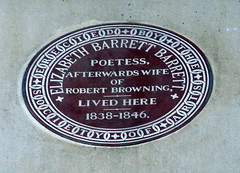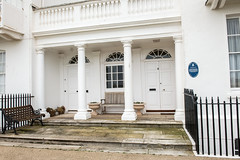Elizabeth Barrett Browning
Commemorated on 8 plaques
Elizabeth Barrett Browning (1806-1861) poet lived here
99 Gloucester Place, London, United Kingdom where they lived
Elizabeth Barrett Browning 1806-1861 poet lived in a house on this site 1838-1846
50 Wimpole Street, Westminster, W1, London, United Kingdom where they lived (1837-1845)
Elizabeth Barrett Barrett Poetess, afterwards wife of Robert Browning, lived here 1838-1846
50 Wimpole Street, London, United Kingdom where they lived (1837-1845)
Fortfield Terrace Built 1790-94 on Manor Land by Polish architect and speculative builder, Michael Novosielski, who died before its completion. From 24th June to 24th August 1831 Grand Duchess Helena of Russia, Sister-in-Law of the Czar, rented No. 8 for herself and No. 7 for her entourage. Visit commemorated by double-headed eagle, symbol of Imperial Russia, on the central pediment. In 1831 the father of Elizabeth Barrett Browning with his family rented No. 8 for a year.
Fortfield Terrace, Sidmouth, United Kingdom where they lived (1830)
Elizabeth Barrett Browning 1806-1861 poet lived here 1838-1841
Beacon Hill, Torquay, United Kingdom where they lived (1837-1840)
Qui scrissi e mori Elisabetta Barret Browning che in cuore di donna conciliava scienza di dotto e spirito di poeta e fece del suo verso aureo anello far Italia e Inghilterra pone questa memoria firenze grata 1861
Casa Guido, Piazza San Felice 8, Florence, Italy where they lived -1861) and died (1861)
Sedotta dal fascino di ouesta vallata nell estate del 1849 Elizabeth Barrett consegno la dichiarazione poetica del suo eterno amore allo sposo Robert Browning. 'Ma amami per amor dell amore, che sempre piu tu passa amarmi nell eternita dell amore' (Sonetti Dal Portoghese, XIV:13-14)
English translation: Seduced by the charm of this valley in the summer of 1849, Elizabeth Barrett composed the poetic statement of her eternal love for her husband Robert Browning. 'But love me for the sake of the love that passes more and more you love me in the eternity of love' (Sonnet of the Portuguese, XIV:13-14)
?, Bagni di Lucca, Italy where they visited
'Cedar Shade' formerly 'Belle Vue'. From 1833 to 1835 Elizabeth Barrett Browning lived here with her family. She formed a romantic attachment to George Hunter, the Congregational Minister. In 1835 the family removed to Wimpole St. and in 1846 she married the poet Robert Browning.
, Sidmouth, United Kingdom where they lived (1832-1834)


_Poet_lived_here.jpg?width=250)




